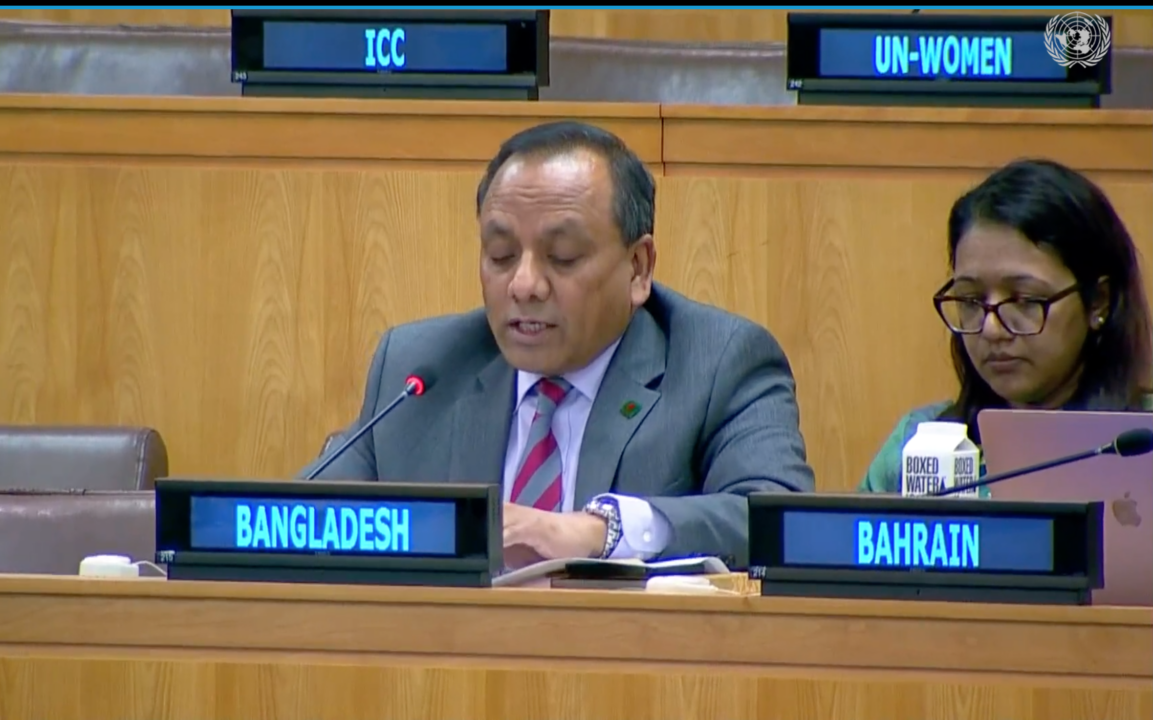Thank you, Mr. Chair.
I wish to commend you and the Bureau for your excellent stewardship of the 3rd Committee sessions this year.
I thank the Secretary General and the special mandate holders for their useful reports and the recommendations.
Mr. Chair,
Children account for 40 percent of the population in Bangladesh. They are the future of our country. And their empowerment is essential for the progress of our nation.
We believe vindication of rights of children in all spheres of life serves their best interest. We are one of the early ratifying countries of the Child Rights Convention and its Optional Protocols. In 2013, we have enacted a new law to give effect to the provisions of CRC. The law provides for a number of institutional mechanisms for promotion and protection of the rights of the children. Our Government is working with the National Human Rights Commission to establish a separate Child Rights Commission.
To ensure children’s perspective in our national policies and programmes, we have introduced child friendly budgets. Currently all relevant Ministries are adopting and implementing child friendly budgets. ‘Child Welfare Boards’ have been established in the District and Upazila levels to supervise overall wellbeing of the children. Child Day Care Centre Act, 2021 has been enacted for safety of the children of working women. Under this law Child Care Centres have been set up in 6,160 industrial establishments across the country.
The government has also expanded social safety nets to cover more children especially the orphans and has also been implementing family-based reintegration and rehabilitation programme for the destitute children. Street Children Rehabilitation Programme has been undertaken for withdrawal and overall wellbeing of the street children.
Mr. Chair,
Child marriage constitute a serious violation of children’s human rights. The Government is pledge-bound to eliminate child marriage entirely by 2041. Aside from enforcing Child Marriage Restraint Act 2017, we have been investing in socio economic empowerment of women and girls as a means to prevent child marriage.
In order to eliminate violence against children, specials laws have been put in place. A National Action Plan to Prevent Violence against Women and Children is currently under implementation. A 24-hour toll-free Child Helpline and a mobile app named ‘Joy’ have been in operation to provide a free telephone services to children facing violence, abuse and exploitation. To ensure children’s access to justice, we have established separate tribunals and child -friendly desks in each police station. Child victims are provided with free legal and reintegration services through one-stop crisis centre, national trauma counselling centre, and safe homes in every divisional cities.
We have pledged to eliminate all forms of child labour by 2025 and phased action plans have been in place to implement the pledge.
Mr. Chair,
In the education sector, we are making every effort to recover from the learning loss caused by the pandemic. Free textbooks are distributed to primary school students through the ‘Book Festival’ on January 1st every year. In order to cope with the post-covid realities we have developed a Blended Education Master Plan under which 60,000 multi-media classrooms will be set up by next year.
We continue to call for increased global efforts to reduce digital divide and ensure access to digital learning by all children everywhere. In this regard we welcome the the ‘Gateway to Digital Learning Initiative’ launched by UNESCO & UNICEF during the Transforming Education Summit.
Significant improvements have been made in children’s health in Bangladesh, including in universal immunization. This has been possible due to adoption of a more holistic and sector-wide approach. Health services provided through mobile phones and a 24-hour web-portal are complementing the work of over 16,000 community and local health clinics all over the country. As many as 133 thousand autistic children have been brought under government provided therapeutic services.
Here at the UN, our delegation has spearheaded two resolutions – one on vision and another on drowning prevention, both targeting children as the worst victims of preventable blindness and drowning.
Mr. Chair,
As the world continues to navigate through interlocking global challenges, children continue to bear the worst brunt. Millions of children worldwide continue to live in poverty, hunger, discrimination, violence, and exploitation. COVID-19 pandemic continues to take its toll on children’s physical and mental health as well as their access to education. Children living in climate vulnerable, conflict affected and least development countries are worse off.
In order to secure a sustainable future for the humanity, protection and promotion of children’s right must come first. We must do right by every child everywhere, by ensuring their rights to food, education, protection, health, safety and their freedom.
I thank you.

